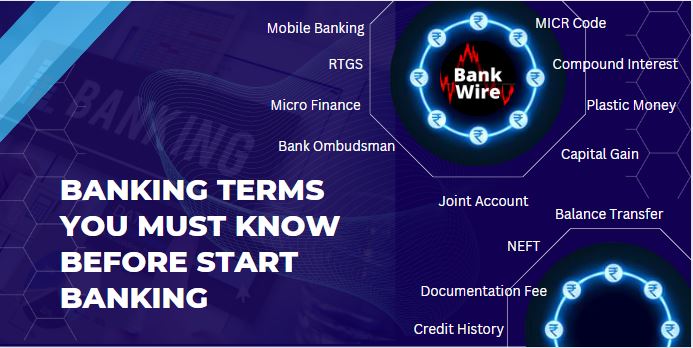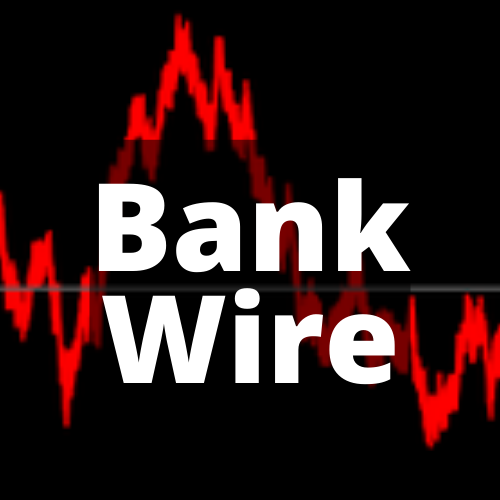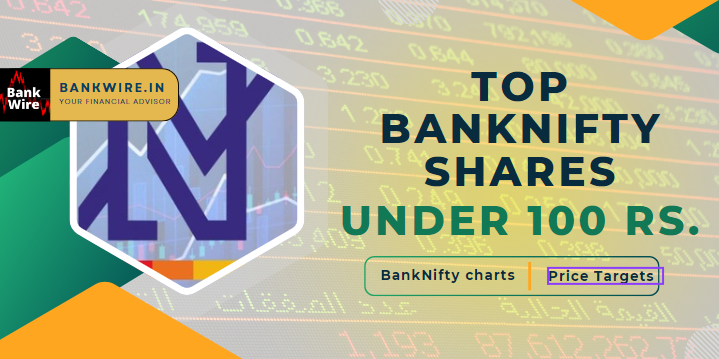
Banking Term and technical words you must know
Understand bank terminology, How banking terms can help you grow financially
Banking Term: Banking terminology also referred as banking terms is must to understand for people while banking. These banking terminologies are easy to understand and useful to everybody including banking for students. Here in this article we will see about all technical words which we use in banks.
What is NEFT (National Electronic Funds Transfer)?
NEFT is an electronic means to transfer money from one bank to another or within the same branch. Depending on the bank, NEFT charges and the minimum fund transfer amount may vary. NEFT has no minimum or maximum limit on the transfer of amount.
What is a Linked Account?
An account that is linked to your other accounts for the purpose of fund transfer is called a linked account. Generally, people link their account for subsidy or other direct benefit transfers.
What is Base Rate?
This is the minimum rate at which a bank can lend to its customers. A bank cannot lend below the base rate. All interest rates use the base rate to determine interest rate for various loans as the benchmark. RBI, time to time increase or decrease repo rate, SLR, CRR.
What is Balance Transfer? Know about this Banking Term
This is a credit card payment option for people using more than one credit card. Like the name suggests, balance transfer is when you transfer the balance of one credit card to another. This is useful when a card holder is unable to make full payment on his/her card, or if the second credit card offers a lesser rate of interest.
What is Cashback?
Cashback is an offer provided primarily by credit card companies where they offer some amount of money back to the cardholder that he/she has spent on the card. Whenever a bank card holder spends through the card, the company will reward the customer with points. The customer can use the reward points later to shop or can redeem for money.
What is Credit History?
Credit history is the past behavioral patterns of a customer with regard to loans. A credit bureau will collect the information of a customer and then translate it to a number between 300 and 900. This is your credit score and the higher the credit score, the better your chances are to avail a loan or a credit card.
What is Collateral? Know about this Banking Term
Any security provided to the bank in exchange for a loan is known as collateral. A collateral can be in the form of land, gold, etc. This is called a secured loan and is less risky than an unsecured loan for the lender. In case of secured loans, the lender may auction off the collateral if the borrower fails to pay off his/her loan.
What is Documentation Fee?
Before lending money, lenders have to evaluate the credit worthiness of a customer. Generally, lenders charge for this also for any documentation, lenders charge some fees. These charges are documentation fees.
What is Fixed Interest Rate?
A fixed interest rate is when the rate of interest for a loan remains constant throughout the entire tenure.
What is the Floating Rate of interest? Know about this Banking Term
This is the opposite of a fixed rate. A floating rate of interest are interest rates that change during the tenure of the loan. These interest rates change as per the changes of interest rates in the economy. Banks generally change this interest rate according to the policies of RBI.
What is MICR Code?
This is a nine digit code found in the bottom right hand corner of a cheque leaf. This code varies from bank to bank and is an acronym for Magnetic Ink Character Recognition. To know the MICR of all banks in India, click here.
What is a No-frills Account?
This is a rudimentary savings account that requires no minimum balance to enjoy benefits like net banking, online fund transfer, etc.
What is Electronic Clearing Service or ECS?
This is a technology used by banks wherein a certain amount of money is directly debited from your account on a specified date every month towards the payment of a loan, mutual fund account, etc.
What is the Processing Fee?
In order to process a loan application of a customer, banks usually charge a fee. This fee is known as a processing fee.
What is RTGS or Real Time Gross Settlement?
RTGS (Real Time Gross Settlement) is a fund transfer technology used by banks for same bank or interbank fund transfer. Contrasting NEFT or RTGS, transferring funds with RTGS is instantaneous and more nominal with regard to the costs incurred. There is a limit of Rupees 2 Lakhs to use RTGS facility.
What is KYC?
KYC (Know Your Customer) is a procedure that all banks undergo in order to establish the correct identity of a customer. This is to ensure that no fraudulent operations are taking place in the bank. Now banks have started to issue E-KYC numbers which a person can use in case of KYC.
What is a Routing Number? Know about this Banking Term
This is a number that can identify your bank based on the geographical location of the institution. Bigger banks may have several routing numbers while smaller ones have only one.
What is APR?
Annual Percentage Rate (APR) is the yearly interest you earn by depositing your money into an account. This does not take into consideration the compound interest. However, banks also offer compounding rates on interest on deposits.
What is Compound Interest?
Generally banks provide simple interest on a deposit or saving account. Compound interest is the interest earned on the deposit plus the interest earned on the same deposit previously.
For example, if you’ve deposited Rs.1 lakh into a bank, and the bank promises to pay you a 10% interest, you will earn an interest of Rs.10,00. The next year however, you will be receiving an interest on Rs.1, 10, 000, i.e., the initial amount deposited plus the interest earned on that amount.
What is the Return Item Fee?
In case a cheque has bounced due to insufficient funds or another reason, the banks will penalize the account holder with a fee. This fee is called a returned item fee.
Click here to know the Cheque Bounce Meaning, it’s consequences and precautions
What is Overdraft Fee?
In the event that you run out of money in your account, certain banks under certain schemes allow you to withdraw more money than you have in your account. This is a loan, in a sense, and the bank will charge you a fee on repayment. This fee is called overdraft fee. Normally, overdraft facility is provided in Jan Dhan Accounts as well as salary saving accounts.
What is Liquidity?
The ability to sell an asset in the market without affecting its price is called liquidity.
What are Monetary Policies?
This refers to the rules and regulations that the Reserve Bank of India have put in place in order to standardize banking procedures in the nation. Based on the monetary policy, banks and NBFCs decide their lending and deposit rate of interest.
What is Plastic Money?
This is a reference to currency used by individuals other than hard cash. Most people know this as debit and credit cards. There are many other cards available with banks and financial institutions like travel cards, specific purpose cards, membership cards etc.
What is Cash Reserve Ratio (CRR)?
RBI has mandated all banks to maintain a certain percentage of the total bank deposits in cash. This percentage with regard to the total deposits is called cash reserve ratio.
What is Statutory Liquidity Ratio (SLR)?
Banks are required to maintain a minimum reserve in the form of gold. The ratio is called statutory liquidity ratio.
What is the Bank Rate?
This is the rate of interest that the RBI levies on banks if they wish to borrow money.
What is Basis Point?
This is one hundredth of a percentage. Basis point indicates change in interest rates.
What is Capital Gain?
This is a profit or gain attained by a bank by sale of investments or properties. Based on capital gain, the government of India charges income tax. Click here to know 15 tricks to save income tax.
What is Debtor? Know about this Banking Term
A debtor is an individual or organization that owes money to the bank or any other financial institution. For example if you avail a home loan, car loan, education loan, personal loan, Gold loan, agriculture loan, business loan etc. you are a debtor.
Click here to know How to manage EMIs to pay back less
What is a Joint Account?
A joint account is an account where two or more people have equal rights and liabilities of a single account. There are two types of joint accounts, one in which any of account holders can operate the account and another requires operation jointly.
What is APY?
Annual percentage yield (APY) is the percentage of interest you gain on interest every year, excluding compound interest. This is the same as Annual Percentage Rate (APR).
What is a Bank Ombudsman?
A bank ombudsman is the authority to look into complaints if in case other modes of complaints haven’t worked out for the customer. Click here to know more about bank ombudsman
What is Credit Rating? Know about this Banking Term
This is an assessment of an individual’s past credit history. Credit rating is equated into a number between 300 and 900. This is usually the main determinant of whether an individual attains a loan or not. Credit bureaus collect this data on all individuals that have a history of credit.
What is Micro Finance?
Banks or NBFCs provide small loans to the poor in urban, rural and sub-urban parts of the country in order to help them raise their income level. This is known as micro financing. There are various government business loan schemes in India which are classified under micro finance.
What is Mobile Banking?
Almost all the banks and financial companies in India allow their customer to transact from mobile app. This service is known as mobile banking. Click here to know about your bank’s mobile banking
Important Link
Other Posts:
- How to claim Capital Gain Tax Exemption? Know rules
- Nifty 50: Details of listed Shares and Weightage in Index
- Top 6 Latest GST News And Developments
- Problem with banks which harm environment
- Complaint against Bank with Bank Ombudsman
Read Category-wise posts
Banking | Bank Account | Bank Deposit Schemes | Loans | Bank Cards | Credit Cards | Debit Cards | Search IFSC & MCLR Code | Insurance | Bank Jobs and Exams | Stock Market | GST | EMI Calculator




